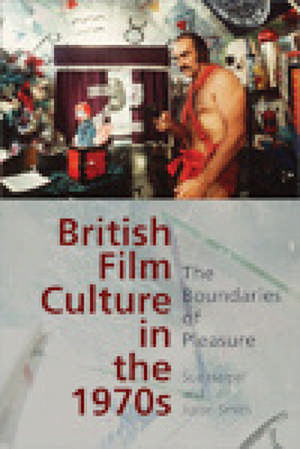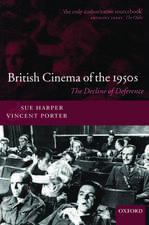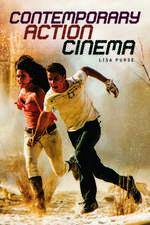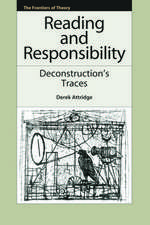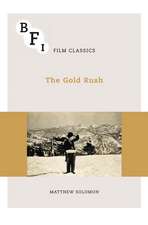British Film Culture in the 1970s
Autor Sue Harper, Justin Smithen Limba Engleză Paperback – 27 ian 2013
This volume draws a map of British film culture in the 1970s, providing a long-awaited and authoritative history of the period. The culmination of an AHRC-funded project at the University of Portsmouth, this study locates British cinema socially and explores its cross-cultural relationship with other media, including popular music and television. The analysis covers mainstream and experimental film cultures, identifying their production contexts, economic bases and taste-communities.
The book's structure suggests ways of thinking about cultural history afresh. The essays in Part I have been contributed by members of the project, and illustrate the diversity of the moving image culture of the period. In Part II, Sue Harper and Justin Smith investigate how gender relations and social space were addressed in film. A shared visual manner and performance style is shown to characterise this fragmented cinema, and irony and anxiety suffuse the whole film culture. This comprehensive examination charts the shifting boundaries of permission in 1970s film culture, and its re-definition of notions of visual pleasure. For more information about the AHRC-funded project 1970s British Cinema, Film and Video: Mainstream and Counter-Culture (2006-2009) please visit the project website at www.1970sproject.co.uk. Sue Harper is Emeritus Professor of Film History at the University of Portsmouth. She is a cultural historian who has written widely on British cinema, and made numerous appearances on radio and television. Justin Smith is a Principal Lecturer in Film Studies at the University of Portsmouth. His research interests embrace production, reception and exhibition practices, film fandom, and issues of cultural identity and popular memory.
| Toate formatele și edițiile | Preț | Express |
|---|---|---|
| Paperback (1) | 195.85 lei 3-5 săpt. | |
| EDINBURGH UNIVERSITY PRESS – 27 ian 2013 | 195.85 lei 3-5 săpt. | |
| Hardback (1) | 586.18 lei 6-8 săpt. | |
| EDINBURGH UNIVERSITY PRESS – 31 oct 2011 | 586.18 lei 6-8 săpt. |
Preț: 195.85 lei
Preț vechi: 216.72 lei
-10% Nou
37.48€ • 38.99$ • 30.94£
Carte disponibilă
Livrare economică 24 martie-07 aprilie
Specificații
ISBN-10: 0748681698
Pagini: 326
Ilustrații: 20 b&w illustrations
Dimensiuni: 155 x 231 x 23 mm
Greutate: 0.57 kg
Editura: EDINBURGH UNIVERSITY PRESS
